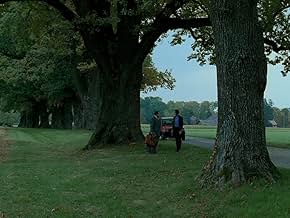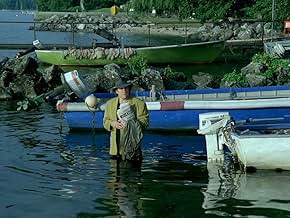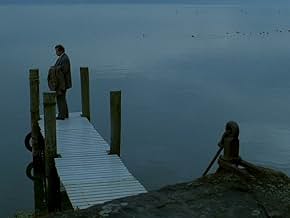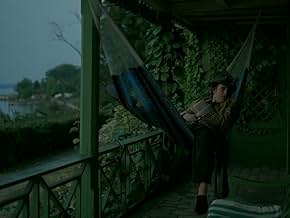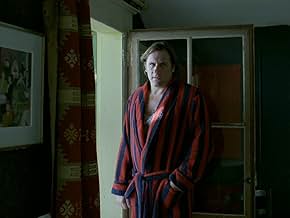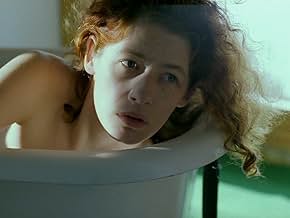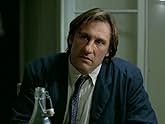NOTE IMDb
6,1/10
1,6 k
MA NOTE
Film sentimental à propos de Simon Donnadieu et de sa décision de quitter sa tendre femme Rachel.Film sentimental à propos de Simon Donnadieu et de sa décision de quitter sa tendre femme Rachel.Film sentimental à propos de Simon Donnadieu et de sa décision de quitter sa tendre femme Rachel.
- Réalisation
- Scénario
- Casting principal
- Récompenses
- 2 nominations au total
Avis à la une
10claudiop
One of my all-time favourite films, IMHO one of Godard's most beautiful and reflective films. It is a contemporary existential allegory and elegeic in style. My recollection is that the pacing is languid and reflective. The emotional and spiritual crises are compelling and insightful, typical of Godard's obsessive observations of relationships. Depardieu and Masliah are wonderful. Uplifting experience. I saw it in San Francisco's Haight-Ashbury in 94.
I try to be wary of sweeping claims because usually they sweep away too much of details that matter, but here I feel confident in saying Hélas pour moi is perhaps the most difficult, demanding Godard film I've encountered thus far. The dialectic tappestry is perfected here, which Godard would subsequently use for the Histoire(s) films, and it's presented to us in the form of a dreamlike reverie. To disentangle this web the film requires we go deeper than the level it operates, an almost insurmountable task.
Charles Baudelaire mused on the idea of the "flaneur", the "stroller" who walks the city in order to experience it. In the emergent observer-participant dialectic, it is important for the observer to remain detached so that free association, the spontaneous and impromptu, can suggest its own portals of understanding. This dissolution of apparent order by which we're taught to experience the world, opens doors in the mind. Likewise, I believe it is important to experience Godard with a certain detachment, to walk through the film in order to experience it.
The other aspect is the dreamlike nature.
Where we do we go when we sleep? Some will say we go in the mind, where we enact vivid, abstract bits of life. Without making the distinction any more overbearing than it needs to be, I'll say that instead we go back into the body from where, in the silence of sleep, we can hear faint traces of the mind's constant, routine stream of thought. Sleeping, we can hear the mind murmur to itself. This should be the most tangible, profound awakening to the illusionary reality of the mind available to us.
The film is this state of consciousness as existential murmur, where characters tenaciously grapple with ideas of love and death in vivid, abstract bits that begin or end abruptly. In pursuit of these ideas, it's thought that the mind should matter, the greatest folly of the French Renaissance, and which notion the young French artists (dandies, surrealists, Dada, Nouvelle Vague) continuously assailed and challenged.
When I say Helas is a difficult film, is when Godard complicates all this by the presence of strange entities that omnipresently exist outside the frame of that consciousness. These entities are in the narrative but not of it, instead they appear as visitations to that world.
One is a book editor who wanders the movie trying to piece together a crucial moment that happened between two lovers in the past, looking for the "missing pages", first of this affair as though it's a book written somewhere, second of the narrative of the movie itself since now his quest for answers becomes ours and we also want to find out what happened, then on a third level life in general. This quest for answers Godard wisely leaves frustrated, as reflection of the uncertain and peremptory. All these properly remain enigmas, as we know life to be true.
The other is a significantly curious device, where the woman cannot recognize her lover, played by Gerard Depardieu, who then poses as or is occupied by God. In the fantastical, surreal conversations that follow in a veranda overlooking the sea, love is put to the test, purpose in life, all of creation.
Here, more importantly than anywhere else in the film, Godard gives us one of his famously thunderous cuts (like the one in Le Mepris). The woman faces away from him as if to scorn him, the screen pulses with light for a second, then another character, elsewhere, muses to the book editor that "God is a character, like me and you, only forms exist". Perfect!
What I see as a desire for contemplation that begins in Godard's work in films like Prenom Carmen, here for the first time leads to a degree of awareness. Bergman never saw this far in his metaphysical anxiety, Antonioni saw further yet because he escaped that murmur of the mind. This awareness of the world as it is he examined again in JLG/JLG, his self styled portrait, and the several Histoire(s) films. Histoire(s) though ends with a more profound realization, that only when life is lived in full, with all the forces available to our body, only then can life stop questioning itself and accept itself as the true answer.
Charles Baudelaire mused on the idea of the "flaneur", the "stroller" who walks the city in order to experience it. In the emergent observer-participant dialectic, it is important for the observer to remain detached so that free association, the spontaneous and impromptu, can suggest its own portals of understanding. This dissolution of apparent order by which we're taught to experience the world, opens doors in the mind. Likewise, I believe it is important to experience Godard with a certain detachment, to walk through the film in order to experience it.
The other aspect is the dreamlike nature.
Where we do we go when we sleep? Some will say we go in the mind, where we enact vivid, abstract bits of life. Without making the distinction any more overbearing than it needs to be, I'll say that instead we go back into the body from where, in the silence of sleep, we can hear faint traces of the mind's constant, routine stream of thought. Sleeping, we can hear the mind murmur to itself. This should be the most tangible, profound awakening to the illusionary reality of the mind available to us.
The film is this state of consciousness as existential murmur, where characters tenaciously grapple with ideas of love and death in vivid, abstract bits that begin or end abruptly. In pursuit of these ideas, it's thought that the mind should matter, the greatest folly of the French Renaissance, and which notion the young French artists (dandies, surrealists, Dada, Nouvelle Vague) continuously assailed and challenged.
When I say Helas is a difficult film, is when Godard complicates all this by the presence of strange entities that omnipresently exist outside the frame of that consciousness. These entities are in the narrative but not of it, instead they appear as visitations to that world.
One is a book editor who wanders the movie trying to piece together a crucial moment that happened between two lovers in the past, looking for the "missing pages", first of this affair as though it's a book written somewhere, second of the narrative of the movie itself since now his quest for answers becomes ours and we also want to find out what happened, then on a third level life in general. This quest for answers Godard wisely leaves frustrated, as reflection of the uncertain and peremptory. All these properly remain enigmas, as we know life to be true.
The other is a significantly curious device, where the woman cannot recognize her lover, played by Gerard Depardieu, who then poses as or is occupied by God. In the fantastical, surreal conversations that follow in a veranda overlooking the sea, love is put to the test, purpose in life, all of creation.
Here, more importantly than anywhere else in the film, Godard gives us one of his famously thunderous cuts (like the one in Le Mepris). The woman faces away from him as if to scorn him, the screen pulses with light for a second, then another character, elsewhere, muses to the book editor that "God is a character, like me and you, only forms exist". Perfect!
What I see as a desire for contemplation that begins in Godard's work in films like Prenom Carmen, here for the first time leads to a degree of awareness. Bergman never saw this far in his metaphysical anxiety, Antonioni saw further yet because he escaped that murmur of the mind. This awareness of the world as it is he examined again in JLG/JLG, his self styled portrait, and the several Histoire(s) films. Histoire(s) though ends with a more profound realization, that only when life is lived in full, with all the forces available to our body, only then can life stop questioning itself and accept itself as the true answer.
By 1993, cinema had become a language unto itself; it was a language that was made up of not only words, but also sounds and images. As cinema history continues, the language has expanded time after time due to the talents and experiments of master filmmakers such as Jean-Luc Godard. All throughout his vast, decade spanning career, Godard has made film upon film, and with each decade of Godard that passes by, the more radical his style becomes. If ever there was a filmmaker that I could say took the cinematic language to Joycean heights, that filmmaker is, without question, Godard. With "Oh, Woe Is Me", Godard practically makes the cinematic equivalent of James Joyce's "Finnegans Wake" by crafting a masterpiece that works as a perplexing jigsaw puzzle, one injected with all kinds of clever jokes as well as sections of poetic beauty.
If one digs deep enough into my history of reviews, they will discover that often I use various terms over and over again to describe movies that I love, and one of the terms I have stumbled upon a seemingly ridiculous multitude of times is "poetic". I have labeled many of Godard's films as "cinematic poetry", and such a term may only mildly fit some of his finest work; however, few of Godard's films fit this phrase as well as this one. If one could translate the language of poetry to that of the cinematic language, the result would directly resemble many of Godard's later films, in particular "Oh, Woe Is Me". Certain sequences reached a height of starkly poetic emotion that I could hardly contain myself. I nearly cried as some of the most beautiful images and words were shown and spoken before my tearful eyes. For me, this was a damagingly powerful film watching experience, even when I had no damn clue what was even happening.
Along with exploring much poetic ground, "Oh, Woe Is Me" also covers deep philosophical questions about love and reunion and personality and death and life and mortality and so on. Godard throws around such essential themes like a careless baseball player, the main difference being that Godard is not careless (and I do not think he is highly athletic either, plus, isn't baseball mainly just an American thing? Do they have it in other countries? I don't travel a lot, so...), instead he is casual. He is able to toss so many fiercely important questions into an eighty minute long art film that it soon comes across as highly necessary for one to watch films such as this a few times. Not to mention, various sequences are made disorienting due to the overlapping dialogue, much of which happens with characters that are anonymous and off camera (much of the time these characters are absent from the setting the camera is mounted in, as well).
Although Godard seems to primarily function as a poet and philosopher in films such as these, he still does not entirely lose the essential label of the "entertainer". Without the factor of enjoyment being at least somewhat mixed into films such as these, there is little reason to watch them, and, luckily, Godard's films are some of the most entertaining of all time! Thankfully, despite the story's often heavy subject matter, in "Oh, Woe Is Me" Godard refuses to shy away from his unique sense of humor. Jokes are casually tossed in a familiar manner to the philosophical musings that are sprinkled throughout the densely layered masterpiece. Sight gags occasionally pop with jest, while witty dialogue and the occasional sly wordplay also merge with the film's tones of magic realism, melancholic romance, mythological fantasy, dark philosophical drama, avant garde cine-puzzle, and surrealist poetry. At one point in the film, an offscreen voice even references the film's bending of tragedy and comedy, and then the enigmatic voice goes on to state that they cannot even tell which is which anymore.
While Godard is certainly not the filmmaker flavor for everyone, mainly due to his strong and radical experimentation that often pushes the boundaries of the cinematic artform, his works must still be acknowledged as some of the most daring, provocative, strange, and unique in all of cinema's history and,despite its lack of fame and acclaim, "Oh, Woe Is Me" may very well be among his absolute finest efforts!
If one digs deep enough into my history of reviews, they will discover that often I use various terms over and over again to describe movies that I love, and one of the terms I have stumbled upon a seemingly ridiculous multitude of times is "poetic". I have labeled many of Godard's films as "cinematic poetry", and such a term may only mildly fit some of his finest work; however, few of Godard's films fit this phrase as well as this one. If one could translate the language of poetry to that of the cinematic language, the result would directly resemble many of Godard's later films, in particular "Oh, Woe Is Me". Certain sequences reached a height of starkly poetic emotion that I could hardly contain myself. I nearly cried as some of the most beautiful images and words were shown and spoken before my tearful eyes. For me, this was a damagingly powerful film watching experience, even when I had no damn clue what was even happening.
Along with exploring much poetic ground, "Oh, Woe Is Me" also covers deep philosophical questions about love and reunion and personality and death and life and mortality and so on. Godard throws around such essential themes like a careless baseball player, the main difference being that Godard is not careless (and I do not think he is highly athletic either, plus, isn't baseball mainly just an American thing? Do they have it in other countries? I don't travel a lot, so...), instead he is casual. He is able to toss so many fiercely important questions into an eighty minute long art film that it soon comes across as highly necessary for one to watch films such as this a few times. Not to mention, various sequences are made disorienting due to the overlapping dialogue, much of which happens with characters that are anonymous and off camera (much of the time these characters are absent from the setting the camera is mounted in, as well).
Although Godard seems to primarily function as a poet and philosopher in films such as these, he still does not entirely lose the essential label of the "entertainer". Without the factor of enjoyment being at least somewhat mixed into films such as these, there is little reason to watch them, and, luckily, Godard's films are some of the most entertaining of all time! Thankfully, despite the story's often heavy subject matter, in "Oh, Woe Is Me" Godard refuses to shy away from his unique sense of humor. Jokes are casually tossed in a familiar manner to the philosophical musings that are sprinkled throughout the densely layered masterpiece. Sight gags occasionally pop with jest, while witty dialogue and the occasional sly wordplay also merge with the film's tones of magic realism, melancholic romance, mythological fantasy, dark philosophical drama, avant garde cine-puzzle, and surrealist poetry. At one point in the film, an offscreen voice even references the film's bending of tragedy and comedy, and then the enigmatic voice goes on to state that they cannot even tell which is which anymore.
While Godard is certainly not the filmmaker flavor for everyone, mainly due to his strong and radical experimentation that often pushes the boundaries of the cinematic artform, his works must still be acknowledged as some of the most daring, provocative, strange, and unique in all of cinema's history and,despite its lack of fame and acclaim, "Oh, Woe Is Me" may very well be among his absolute finest efforts!
A romance about Simon Donnadieu (Gerard Depardieu) and his decision to leave his ever-loving wife Rachel (Laurence Masliah).
This film is inspired by the Greek legend of Alcmene and Amphitryon and attempts to show the desire of a god to experience the truth of human desire, suffering and pleasure. The original scenario began with God riding a train through France and Switzerland, observing all the battles of humanity through the window. This sequence required expensive special effects and Godard finally gave up on the idea after visiting a company that demonstrated for him the effects they achieved for Jean-Pierre Jeunet's "Delicatessen".
What strikes me the most about this film is how Godard brought back that creepy voice from "Alphaville". Though there is no clear connection between the two films, I have to wonder why he chose to use that voice. Personally, I find it very unsettling and it jolts a viewer out of the film... which maybe the point.
This film is inspired by the Greek legend of Alcmene and Amphitryon and attempts to show the desire of a god to experience the truth of human desire, suffering and pleasure. The original scenario began with God riding a train through France and Switzerland, observing all the battles of humanity through the window. This sequence required expensive special effects and Godard finally gave up on the idea after visiting a company that demonstrated for him the effects they achieved for Jean-Pierre Jeunet's "Delicatessen".
What strikes me the most about this film is how Godard brought back that creepy voice from "Alphaville". Though there is no clear connection between the two films, I have to wonder why he chose to use that voice. Personally, I find it very unsettling and it jolts a viewer out of the film... which maybe the point.
I'm surprised that Godard still receives finance to make these style of films. But only he can get away with a modern avant-garde pop clip of words for the intellects. What saves most of his movies is the involvement of a big name French cast who give it their best.
Le saviez-vous
- Citations
Mechanic: You should say: 'Mr' and 'Mrs." No first names. We're not characters in a novel.
Abraham Klimt: Maybe you are.
- ConnexionsEdited into Histoire(s) du cinéma: Une vague nouvelle (1999)
Meilleurs choix
Connectez-vous pour évaluer et suivre la liste de favoris afin de recevoir des recommandations personnalisées
- How long is Oh, Woe Is Me?Alimenté par Alexa
Détails
Contribuer à cette page
Suggérer une modification ou ajouter du contenu manquant

Lacune principale
By what name was Hélas pour moi (1993) officially released in India in English?
Répondre
